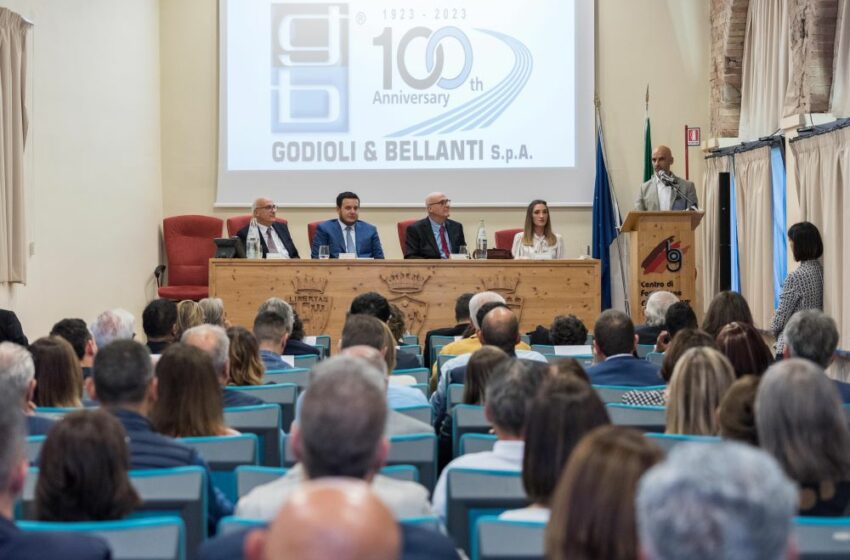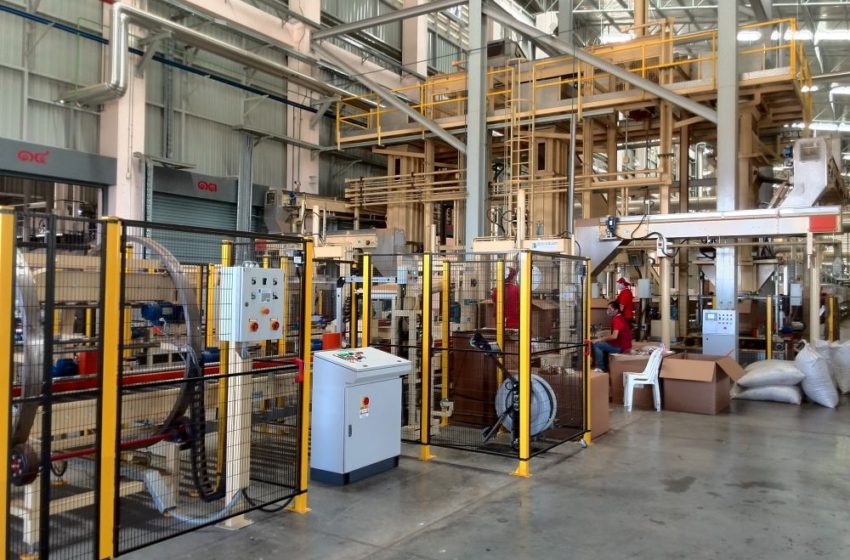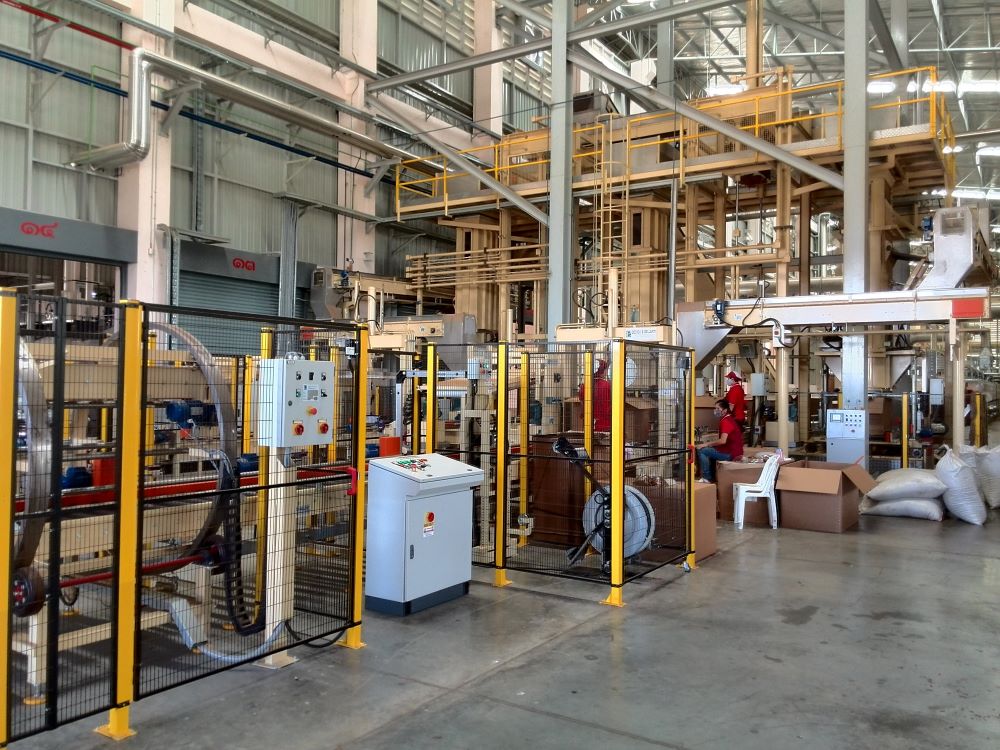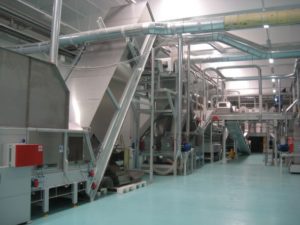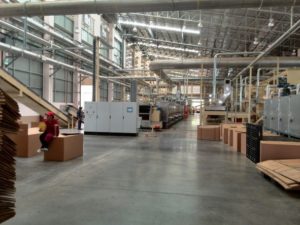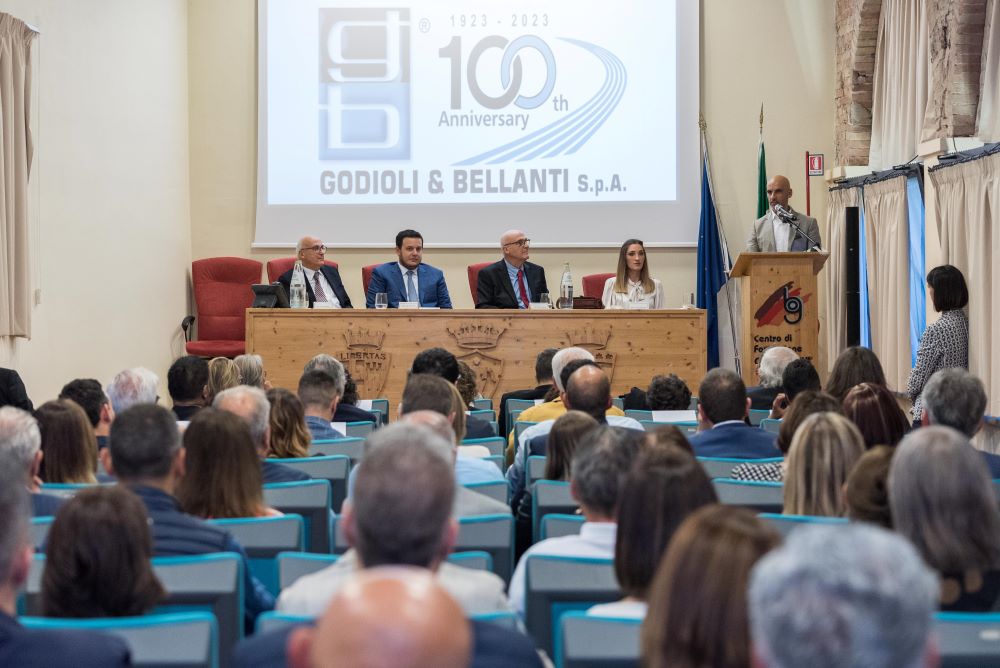
Godioli & Bellanti celebrates its 100th anniversary.
By George Gay
If you are ever due to visit the historic town of Citta di Castello, before you head off, you might like to take some time to read up on Italian artist and physician Alberto Burri, who was born there in 1915 and some of whose later works are on display at a venue repurposed from former Kentucky tobacco curing barns.
The tobacco connection need come as no surprise. Citta di Castello, located in the province of Perugia, Northern Umbria, is the home of Godioli & Bellanti, which was founded in 1923 by Gino Godioli and Angelo Bellanti as an engineering company providing agricultural equipment, much of it to a thriving local tobacco-growing community. One hundred years on, Godioli & Bellanti has evolved and expanded into a company that is known to those working in the global tobacco sector for supplying machinery and equipment for complete leaf and primary processing lines, though it supplies, too, machinery and processing lines for medicinal herbs, other plants and food products.
I would suggest that part of the reason why the company was able in October 2023 to celebrate 100 years of continuous business, during which it has become an important player in the global tobacco industry, is that it had, and has maintained, solid local, family and extended-family roots. Lorenzo Curina, a company veteran who really needs no introduction, told Tobacco Reporter earlier this year that its centenary celebrations were held in premises that had been, in 1923, the company’s headquarters but that had been donated to an educational and training institution when the company needed more space and moved to an industrial area in 1963 under its second-generation leadership.
The institution, the Scuola Operaia Giovanni Ottavio Bufalini, was where Curina’s grandfather had taught and where students are now trained in, among other things, the culinary arts. Appropriately, the formal celebrations, which went hand in hand with a factory and city tour, were held on the ground floor of the institution, where the Godioli & Bellanti workshop had once been but where the institution now runs a typical Italian restaurant for the benefit of its students and customers.
The event was addressed by speakers representing the political, ecclesiastical and academic life of Citta di Castello and attended by 140 guests, including Godioli & Bellanti’s Italian-based tobacco customers, its international agents and its employees, past and present. One of the guests was Elise Rasmussen, the executive director of The GTNF Trust and publisher of Tobacco Reporter, who said it had been an honor to attend the 100th anniversary celebrations and to be asked to propose the congratulatory toast on behalf of the assembled guests. “But it was an honor wrapped in pleasure—the pleasure of catching up with long-standing friends and meeting new ones as we came together from around the world in celebration of that momentous occasion,” she added.
“In my work with Tobacco Reporter magazine, which this year is also celebrating a major anniversary, I have for a long time had the honor of working with the Godioli & Bellanti team, particularly Lorenzo Curina, who is a valued customer and treasured friend, so I took much pleasure in congratulating them all on reaching this milestone and look forward to working with them in the future as this dynamic engineering company forges ahead.”
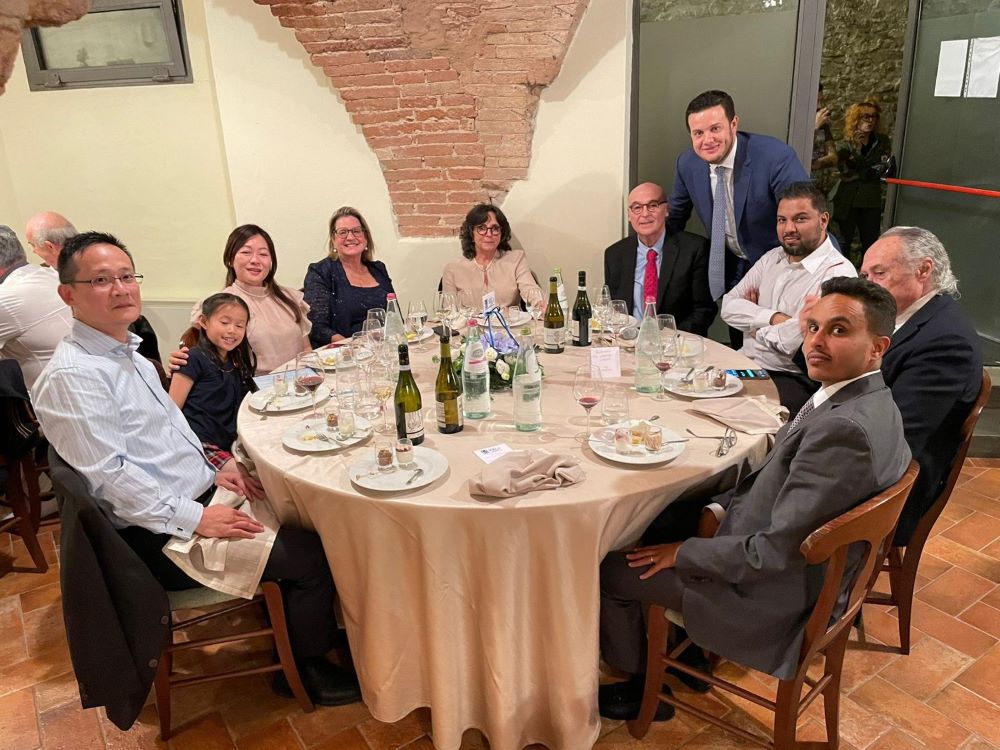
The Ability to Evolve
The reference to a “momentous occasion” was not overwrought. In a changing world, more latterly, a rapidly changing world, it is not easy for a business, particularly, perhaps, a family business, to prosper through 100 years. And Curina, who has been with Godioli & Bellanti for 47 years and who is a shareholder and vice president, was well placed and not afraid to make this point when he spoke at the start of the event, in part thanking all the company’s customers, agents and employees for their various roles in ensuring Godioli & Bellanti’s success. “It wasn’t all rosy,” he admitted. While there were many good times and exciting moments, he said, each generation had faced difficult times during which they had had to draw on all their strengths just to continue in business.
But this reference to the difficult times was brief, and Curina demonstrated his confidence in the company’s future when he talked of the high professional standards that had underpinned its performance during “these first 100 years.” And this commitment to the future was a theme taken up by the company’s managing director, Angelo Benedetti, who represents the family’s fourth generation and who, in his address, promised to carry forward and build upon the successes achieved by previous generations.
Meanwhile, Curina, who knew both the company’s founders, one of whom was his grandfather, and who was mentored by the second-generation partners, spoke with pride of the work carried out by Godioli & Bellanti from the 1920s to the 1950s, when the company’s workshop was engaged in manufacturing products that few were capable of making—products that demonstrated, too, the flexibility of the company and its ability to evolve. For instance, during that time, the company provided equipment that pumped water from the Shebelle River to irrigate fields in Ethiopia and Somalia. And during the economic boom of the post-war era, the company was able to turn its hand to the construction of civil and industrial heating systems for a widening circle of customers.
Then, in the 1960s, came the mechanization of tobacco processing in which Godioli & Bellanti became a significant player, in part because of the relationships built up with two Italian companies, Deltafina and Fattoria Autonoma Tabacchi—relationships that allowed Godioli & Bellanti to grow. Giorgio Marchetti, vice president and production director at Deltafina, on being asked to comment on the anniversary, said Godioli & Bellanti had actively served the tobacco industry with passion and professionalism over the years. “This blend has allowed a family company to achieve 100 years without showing ‘gray hairs’ but still looking young and dynamic,” he said in an email exchange. “The cooperation and experiences gained over the decades working with Deltafina have been beneficial for the growth of both companies.”
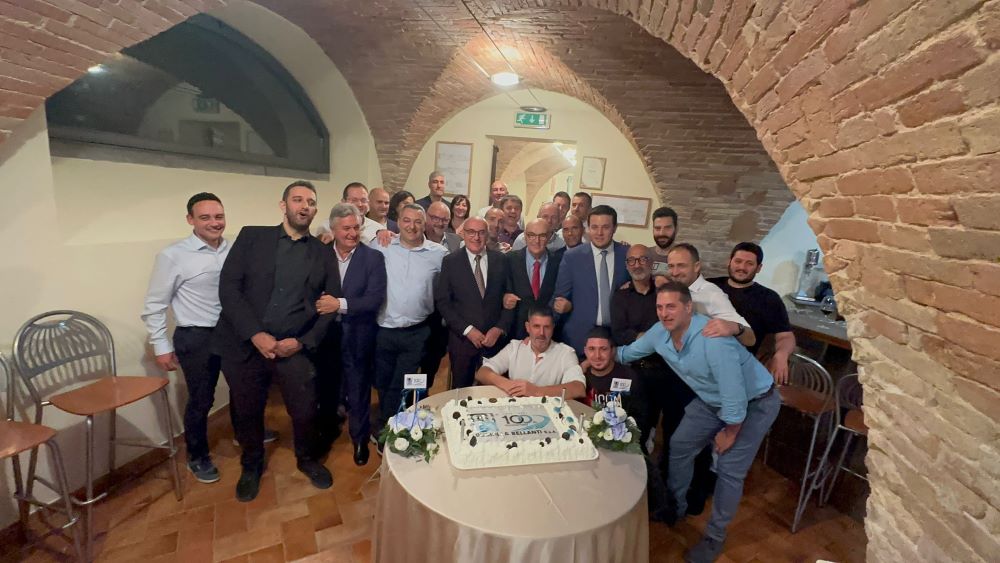
Devotion and Passion
And from its solid Italian base, the company expanded, offering its machinery to companies around the world—wherever tobacco was being processed. One such country is Bangladesh, where Godioli & Bellanti operates through a local agent headed by Shahroze Kabir, though the word “agent” does not do justice to the close relationship. Shahroze told TR in an email exchange that he had returned to Bangladesh from Australia, where he had been working as an accountant following the sudden death in 2018 of his father, Mohammed Jahangir Kabir, who had run the agency and who, incidentally, was a former head of marketing for BAT. Shahroze readily admits that, at that time, he had no experience working as an agent and had never been inside a tobacco factory but was offered the role on the basis of an agreement made between his father and Curina, for whom he said, “a promise is a promise.” ‘‘I suppose they adopted me as a part of the Godioli & Bellanti family and taught me everything I know about the business,” he said.
“I work with many leading European machinery companies, but Godioli and Bellanti are special. They build their machines not just with engineering perfection but with love, devotion and passion …. We have supplied so much tobacco machinery in Bangladesh that it has upgraded the quality of processed tobacco in the country to very high global standards.”
The reference to passion came up again when Mohammed Abob, who was Godioli & Bellanti’s agent in Ethiopia from 2010 to 2019, who is still in touch with the company and who, indeed, attended the anniversary celebrations, replied to a request for comment. Abob said his impression of Lorenzo and his brother Cesare was that they were dedicated and passionate about their work and proud of their company and their city. The company was important to them beyond the business and financial aspects of it. It represented a proud heritage that they were committed to now and in the future.
And the devotion to engineering perfection mentioned by Shahroze was also alluded to by Curina in his opening speech when he said that Godioli & Bellanti had never made mass-produced products. With each project, the company committed to identifying the technical solution that the particular customer and the particular situation required. Each project was a new project, he said.
Like Swiss Watches
Away from the celebrations, TR had an opportunity to ask Curina a few questions, focused mainly on the way that the market for primary processing machinery and equipment had changed and is changing. The first asked how the primary processing facilities of the average factory that Godioli & Bellanti currently served differed from how those facilities were set up 25 years to 30 years ago. Not surprisingly, Curina’s answer focused on technology. Nowadays, the primary departments in which Godioli & Bellanti worked, he said, were characterized by high levels of technology, which meant that, in turn, the operations of those primaries were characterized by high standards of automation, synchronization and cleanliness. They were like Swiss watches, he added.
And asked what would have been the most in-demand pieces of primary processing machinery and equipment 25 years to 30 years ago and what were the most in-demand pieces now, Curina replied that whereas in the past, his company made many lines for Burley toasting, comprising equipment for toasting, casing and top-flavoring, nowadays demand tended to favor lines for producing low-nicotine cut rag. Demand was relatively high, also, for automatic feeding lines, with equipment for de-cartoning tobacco, slicers, direct conditioning cylinders and direct conditioning and casing cylinders.
Turning to the question of whether demand for primary processing machinery and equipment was increasing or decreasing, Curina described the situation as stable, which he found unsurprising since investing in a primary required broad financial shoulders and an intimate knowledge of the tobacco business.
Finally, in answer to another question about demand, Curina said he had noticed that the world of green leaf threshing had moved massively toward the Far East and that the world of primaries was moving in the same direction, though more slowly.


